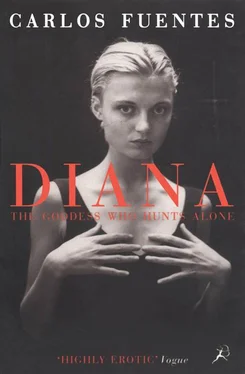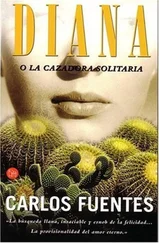Carlos Fuentes - Diana the Goddess Who Hunts Alone
Здесь есть возможность читать онлайн «Carlos Fuentes - Diana the Goddess Who Hunts Alone» весь текст электронной книги совершенно бесплатно (целиком полную версию без сокращений). В некоторых случаях можно слушать аудио, скачать через торрент в формате fb2 и присутствует краткое содержание. Год выпуска: 2012, Издательство: Bloomsbury UK, Жанр: Современная проза, на английском языке. Описание произведения, (предисловие) а так же отзывы посетителей доступны на портале библиотеки ЛибКат.
- Название:Diana the Goddess Who Hunts Alone
- Автор:
- Издательство:Bloomsbury UK
- Жанр:
- Год:2012
- ISBN:нет данных
- Рейтинг книги:3 / 5. Голосов: 1
-
Избранное:Добавить в избранное
- Отзывы:
-
Ваша оценка:
- 60
- 1
- 2
- 3
- 4
- 5
Diana the Goddess Who Hunts Alone: краткое содержание, описание и аннотация
Предлагаем к чтению аннотацию, описание, краткое содержание или предисловие (зависит от того, что написал сам автор книги «Diana the Goddess Who Hunts Alone»). Если вы не нашли необходимую информацию о книге — напишите в комментариях, мы постараемся отыскать её.
Diana the Goddess Who Hunts Alone — читать онлайн бесплатно полную книгу (весь текст) целиком
Ниже представлен текст книги, разбитый по страницам. Система сохранения места последней прочитанной страницы, позволяет с удобством читать онлайн бесплатно книгу «Diana the Goddess Who Hunts Alone», без необходимости каждый раз заново искать на чём Вы остановились. Поставьте закладку, и сможете в любой момент перейти на страницу, на которой закончили чтение.
Интервал:
Закладка:
But that was also the year of the massacre in the Plaza of the Three Cultures in Mexico City and of the Tlatelolco killings. The unpunished murder of hundreds of young students by the armed forces and government agents brought all Mexicans together, despite our biological or generational differences. It united us, I mean, in terms not only of political parties but of grief. At the same time, it divided us according to whether we supported or opposed the government’s behavior. The writer José Revueltas went to jail because of his participation in the movement for reform. At a Freedom of the Press Day dinner, Martín Luis Guzmán, the novelist of the Mexican Revolution, praised President Gustavo Díaz Ordaz, who was responsible for the slaughter. Octavio Paz resigned his ambassadorship in India. The poet Salvador Novo intoned an aria of thankfulness to Díaz Ordaz and our national institutions. In Paris, I circulated petitions demanding amnesty for Revueltas and condemnations of the violence with which the government, lacking political answers, had so bloodily responded to the students’ challenge.
The students were no more or less than the children of the Mexican Revolution that I had explored in my first books. They were the youth educated by the revolution, which taught them to believe in democracy, justice, and liberty. Now they were asking only for that, and the government, which had supposedly emanated from the revolution, answered them with death. The official argument until that moment had been: We’re going to pacify and stabilize a country ravaged by twenty years of armed conflict and a century of anarchy and dictatorship. We’re going to provide education, communication, health, and economic prosperity. For your part, you citizens are going to allow us, in order to attain all that, to postpone democracy. Progress today, democracy tomorrow. We promise. That was the pact.
The kids of 1968 asked for democracy today, and that demand cost them their lives, but it gave life back to Mexico.
I expected the new writers to translate all this into literature, but I did not exempt myself from a hard look: I accused myself of a complicity and blindness that kept me from participating in a better way, more directly, in that parting of the waters in modern Mexican life that was 1968. My recurring nightmare was a hospital where the authorities banned the students’ parents and relatives, where no one bothered to tie a tag to the naked toe of a single corpse …
“We’re not going to have five hundred funeral processions here tomorrow,” said a Mexican general. “If we allow that, the government collapses …”
There were no processions. There was a common grave. My wife, Luisa Guzmán, sent me tranquil but secretly anguished letters: “I was rehearsing in the Comonfort theater in the Bellas Artes complex, just opposite Tlatelolco, when I began to hear a lot of shooting. I saw the government helicopters mowing down students and ordinary people indiscriminately. It went on for more than an hour, and when I left the theater the students threw themselves at me and the other actors, shouting, ’They’re killing your children!’ I’ve never heard such screams of horror and desperation. It was the worst night in many lives. The next day, the newspapers made no mention of the helicopters and said thirty people had lost their lives. No one knows how the shooting began. The kids said some agents mixed in with the demonstrators probably fired the first shots. Then someone saw them receiving arms and orders from the soldiers. Everyone has a different version of what happened. Everyone is also more and more afraid every day, not only of the violence but of what’s behind the violence, and so as not to serve secret interests they prefer to serve no one …”
I answered that I wanted to come home to Mexico and get more involved. I’d just visited Prague. The world was changing its skin; something had to be done.
“Mexico is not Prague,” Luisa Guzmán wrote back, “as you well know. The middle class is scared and is siding with the authorities, with law and order. I’ve talked to taxi drivers and poor people. Their ignorance and indifference are still unshakable. They swallow all the lies they hear on television or read in the papers, and they go on believing in the red-menace bogeyman. I know, I know, in spite of all that or because of it, we have to continue fighting, and if someone gets caught in the crossfire, well, it’s just bad luck. But to come and put your head in the wolf’s mouth only to find out it was a trap set to catch idealists seems to me absurd, sad, and even ridiculous. Student leaders disappear mysteriously, without a trace. Others have been all but killed by torture. Your only chance to take part would be from underground. Betrayal and corruption are too deeply rooted here. Perhaps there are half a dozen young people who could actually withstand the bombardment of half a million pesos, but most would end up giving in. Pardon my pessimism — I don’t want to avoid responsibility, but I do want to calm down that enthusiasm you picked up in Czechoslovakia. Not a day goes by here without someone calling you, in writing or out loud, a traitor to your country. You shouldn’t come back. It’s all the same to me whether you’re a hero or a traitor, and I refuse to talk to anyone. I’m tired of hearing superficial judgments…”
I did return in February 1969. One morning, angry and tearful, Luisa Guzmán and I walked hand in hand around Tlatelolco Plaza. My literary imagination would allow me only to write a theatrical oratorio on the Conquest of Mexico, another of those savage wounds driven in the body of what we call, with no clear definitions, the state, the country, the nation … Mexico was always sewn together with stabs, always invented by means of survival. Elena Poniatowska and Luis González de Alba wrote the great books on the Tlatelolco tragedy, and I had to content myself with admiring them, feeling they spoke in my name.
Now this accidental meeting with the student Carlos Ortiz in the Santiago plaza awakened all those feelings in me again. Not everyone had given in, as Luisa Guzmán had predicted they would. But the one who had been hiding was me; the traitor was me. I couldn’t respond with the courage I owed to the loyalty and patience of my wife. I had returned to Mexico and tried to compensate for my double burden of political horror and writing block with the plaything of love, refusing — perhaps forever — to enter further into Luisa’s love, to make it exclusive, to penetrate more deeply into the life of the woman who in those moments would have enabled me to venture more deeply into politics and literature. I broke Ariadne’s thread. My frivolity is unforgivable. I was to pay for my abandonment of Luisa many times, again and again, in the years left to me. I just couldn’t start over with her. Perhaps I should have reconstructed our love. Was it reconstructible, or was it already a great void, a lie, a repetition? Hand in hand with her, I walked Tlatelolco Plaza. Tenderness and horror mixed in my heart: was my rejection of this ceremony of death only a pretext to affirm a capacity for abstract, general love without specific content? Was I incapable of truly loving someone? Was I able to bedazzle myself by multiplying adventures only in order to convince myself, falsely, that I really could love? Why didn’t I see that the love she was offering me then, at my side, was known, maybe even routine, but certain?
Tlatelolco for me was a terrible sign — my own wound as a writer and a lover — of the separation between the vital content of things and their literary expression in my work. Now, in Santiago, I was going to sit down and prove to myself that I could climb out of my hole. Anguished, I was also happy. This mad love with Diana could be my new point of departure. If the original vein of my literature had run out, what would the new one be? Would love tell me? The answer would depend on the intensity of that tenderness. That’s why I had abandoned my house, betrayed my wife, exposed myself to yet another cruel fall into disillusion. How could Diana ask me to spend the day watching her get made up and have her hair done on the set? There’s nothing so tedious as making a movie. I was not going to waste my time. In my name or in hers.
Читать дальшеИнтервал:
Закладка:
Похожие книги на «Diana the Goddess Who Hunts Alone»
Представляем Вашему вниманию похожие книги на «Diana the Goddess Who Hunts Alone» списком для выбора. Мы отобрали схожую по названию и смыслу литературу в надежде предоставить читателям больше вариантов отыскать новые, интересные, ещё непрочитанные произведения.
Обсуждение, отзывы о книге «Diana the Goddess Who Hunts Alone» и просто собственные мнения читателей. Оставьте ваши комментарии, напишите, что Вы думаете о произведении, его смысле или главных героях. Укажите что конкретно понравилось, а что нет, и почему Вы так считаете.












